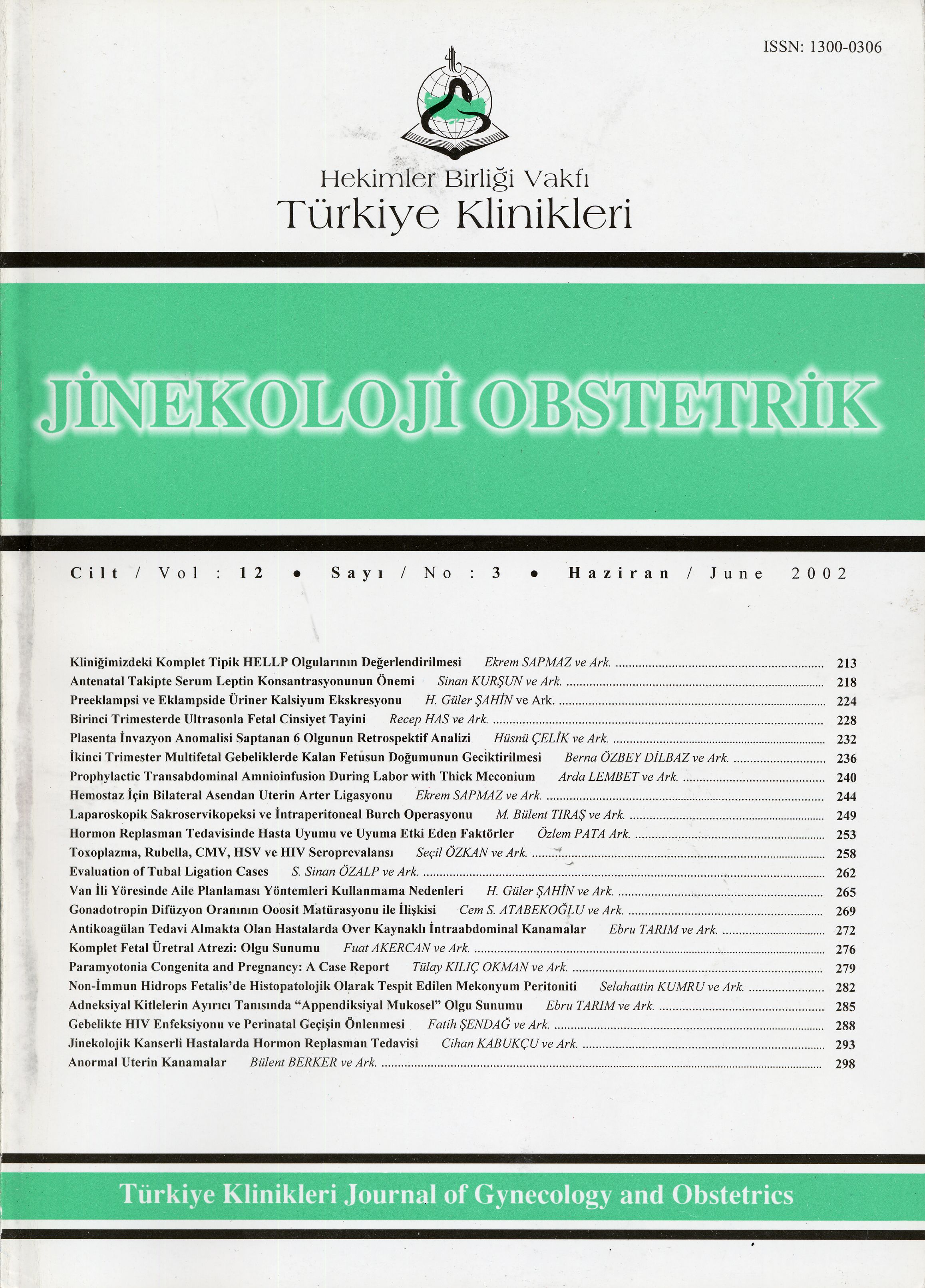Open Access
Peer Reviewed
ARTICLES
3471 Viewed1367 Downloaded
Compliance With Hormon Replacement Therapy And Factors Affecting The Compliance
Hormon Replasman Tedavisinde Hasta Uyumu veUyuma Etki Eden Faktörler
Turkiye Klinikleri J Gynecol Obst. 2002;12(3):253-7
Article Language: TR
Copyright Ⓒ 2025 by Türkiye Klinikleri. This is an open access article under the CC BY-NC-ND license (http://creativecommons.org/licenses/by-nc-nd/4.0/)
ÖZET
Amaç: Hormon replasman tedavisinde hasta uyumu, uyuma etki eden faktörler ve tedavi bırakma nedenlerinin araştırılması.Çalışmanın Yapıldığı Yer: Mersin Üniversitesi Tıp Fakültesi kadın Hast ve Doğum A.DMetod: Kasım 1999 ve Haziran 2000 tarihleri arasında başvuran HRT almamış ve HRT için kontraendikasyonu olmayan 205 olgunun yaşı, menopoz süresi, eğitim durumu, menopoz tipi (cerrahi, doğal) bilgi formlarına alındı. Cerrahi menopoz olgularına 17? Estradiol, doğal menopoz olgularına Tibolone veya 17? Estradiol + Norethidrone asetat içeren preperat başlandı. Tedavinin birinci yılında tüm olgular hastaneye çağrılarak tedaviye devam, devamı etkileyen faktörler saptandı. Tedaviyi bırakma nedenleri soruldu.Bulgular: Olguların 71inin (%35.5) ortalama 3.6 ayda tedaviyi bıraktığı gözlendi. Cerrahi menopoz olgularında, eğitim durumu yüksek hastalarda ve sadece östrojen kullanan olgularda tedavi uyumunun daha fazla olduğu saptandı (p<0.05). Yaş ve menopoz süresi bakımından tedaviyi bırakan ve devam eden olgular arasında anlamlı fark yoktu (p>0.05). Doğal menopoz olgularında en sık gözlenen tedaviyi bırakma nedeni vajinal kanama iken, cerrahi menopoz olgularında kanser korkusu idi.Sonuç: İlaca bağlı yan etkiler HRT de uyumu etkilemektedir. İlacın kısa ve uzun dönemde getireceği avantajlar ile olası yan etkilerin anlatılacağı eğitim programları hasta uyumunu arttırılabilir.
Amaç: Hormon replasman tedavisinde hasta uyumu, uyuma etki eden faktörler ve tedavi bırakma nedenlerinin araştırılması.Çalışmanın Yapıldığı Yer: Mersin Üniversitesi Tıp Fakültesi kadın Hast ve Doğum A.DMetod: Kasım 1999 ve Haziran 2000 tarihleri arasında başvuran HRT almamış ve HRT için kontraendikasyonu olmayan 205 olgunun yaşı, menopoz süresi, eğitim durumu, menopoz tipi (cerrahi, doğal) bilgi formlarına alındı. Cerrahi menopoz olgularına 17? Estradiol, doğal menopoz olgularına Tibolone veya 17? Estradiol + Norethidrone asetat içeren preperat başlandı. Tedavinin birinci yılında tüm olgular hastaneye çağrılarak tedaviye devam, devamı etkileyen faktörler saptandı. Tedaviyi bırakma nedenleri soruldu.Bulgular: Olguların 71inin (%35.5) ortalama 3.6 ayda tedaviyi bıraktığı gözlendi. Cerrahi menopoz olgularında, eğitim durumu yüksek hastalarda ve sadece östrojen kullanan olgularda tedavi uyumunun daha fazla olduğu saptandı (p<0.05). Yaş ve menopoz süresi bakımından tedaviyi bırakan ve devam eden olgular arasında anlamlı fark yoktu (p>0.05). Doğal menopoz olgularında en sık gözlenen tedaviyi bırakma nedeni vajinal kanama iken, cerrahi menopoz olgularında kanser korkusu idi.Sonuç: İlaca bağlı yan etkiler HRT de uyumu etkilemektedir. İlacın kısa ve uzun dönemde getireceği avantajlar ile olası yan etkilerin anlatılacağı eğitim programları hasta uyumunu arttırılabilir.
ANAHTAR KELİMELER: Hormon replasman tedavisi, Hasta uyumu
ABSTRACT
Objective: To investigate the compliance in HRT, the factors which were associated with compliance and the reasons for the discontinuation of treatment.Institution: Mersin University Faculty of Medicine. Obstetrics and Gynecology Department Methods: Between October 1999-June 2000, 205 postmenopausal women with no history of HRT and contraindication to HRT were studied. Patients age, years since menopause, educational status, menopause type (surgical or natural), were recorded. 17 ? Estradiol was given to surgical menopause on the other hand tibolone or 17 ? Estradiol + Norethisterone was given to the natural menopause women. After one year of treatment all women recalled to the hospital. The compliance to the HRT and the factors affecting the compliance were determined. The reasons for the discontinuation of treatment were asked.Results: 71 women (35.5%) discontinued treatment with an average 3.6 months duration of use. The compliance of the women with surgical menopause, high educational status and using unopposed HRT were higher than the others. Age and years since menopause was not different between the women continuing and discontinuing HRT. Bleeding episodes was the most common reason for discontinuation of HRT in the natural menopause women otherwise fear of cancer in the surgical menopause women.Conclusion: Negative side effects of HRT influence the compliance. The Patients acceptance can be improved with educational programmes including the short -long term advantages and usual side effects of HRT.
Objective: To investigate the compliance in HRT, the factors which were associated with compliance and the reasons for the discontinuation of treatment.Institution: Mersin University Faculty of Medicine. Obstetrics and Gynecology Department Methods: Between October 1999-June 2000, 205 postmenopausal women with no history of HRT and contraindication to HRT were studied. Patients age, years since menopause, educational status, menopause type (surgical or natural), were recorded. 17 ? Estradiol was given to surgical menopause on the other hand tibolone or 17 ? Estradiol + Norethisterone was given to the natural menopause women. After one year of treatment all women recalled to the hospital. The compliance to the HRT and the factors affecting the compliance were determined. The reasons for the discontinuation of treatment were asked.Results: 71 women (35.5%) discontinued treatment with an average 3.6 months duration of use. The compliance of the women with surgical menopause, high educational status and using unopposed HRT were higher than the others. Age and years since menopause was not different between the women continuing and discontinuing HRT. Bleeding episodes was the most common reason for discontinuation of HRT in the natural menopause women otherwise fear of cancer in the surgical menopause women.Conclusion: Negative side effects of HRT influence the compliance. The Patients acceptance can be improved with educational programmes including the short -long term advantages and usual side effects of HRT.
MENU
POPULAR ARTICLES
MOST DOWNLOADED ARTICLES





This journal is licensed under a Creative Commons Attribution-NonCommercial-NoDerivatives 4.0 International License.










